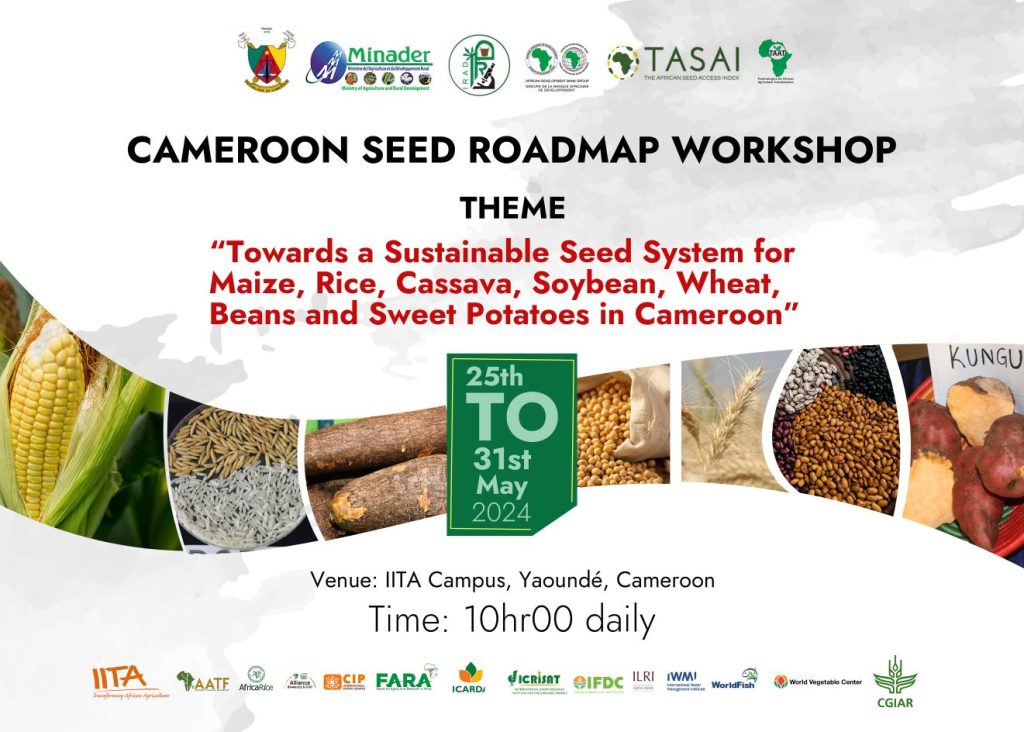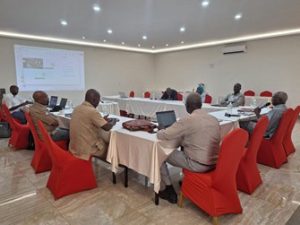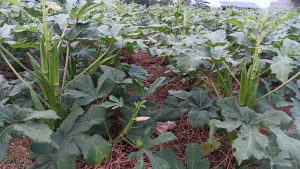Unlocking Agricultural Potential: Cameroon Develops Seed Roadmap for Sustainable Growth

Cameroon is at a critical juncture in its agricultural transformation journey as smallholder farmers across the country shift from subsistence farming to commercial agriculture.
Access to high-quality seeds ensures this shift leads to sustainable growth and enhanced food security. Recognizing this, stakeholders from across Cameroon’s agricultural landscape gathered at the IITA Campus in Yaoundé from the 28th to the 31st of May 2024 to chart the course for the country’s seed sector.
The event, spearheaded by the Technologies for African Agricultural Transformation (TAAT) programme, marked a significant step forward in developing a comprehensive seed road map. With its potential to guide future investments and strategies, this roadmap inspires optimism for Cameroon’s agriculture’s future, enhancing productivity and food security.
Under the umbrella of TAAT Phase II, a diverse group of key players in the Cameroonian agricultural sector came together for a common cause.
The Ministry of Agriculture and Rural Development (MINADER), Agricultural Research Institute for Development (IRAD), International Institute of Tropical Agriculture (IITA), the African Agricultural Technology Foundation (AATF), and the African Development Bank (AfDB) joined forces with international research institutions such as World Vegetable Centre, Africa Rice Center, ICARDA, and the Alliance of Bioversity and CIAT (ABC).
This inclusive collaboration, with its shared objective of crafting a sustainable Seed system capable of meeting the needs of a growing population and a changing climate, is a powerful testament to the collective commitment to Cameroon’s agricultural development.
Across Africa, TAAT has championed the importance of quality seeds as a cornerstone of agricultural transformation. The program’s core mission is to scale proven agricultural technologies to millions of farmers, thereby boosting productivity, food security, and rural livelihoods.
This effort aligns with the government’s push to modernize agriculture in Cameroon. TAAT’s role as a stakeholder is crucial and invaluable as it facilitates and enhances access to improved seeds, fertilizers, and other inputs that contribute significantly to the transformation of food systems.

During the workshop, participants examined Cameroon’s seed system’s specific challenges and opportunities. These included seed quality control, distribution, affordability, and opportunities for innovation and collaboration. With a focus on key crops such as maize, rice, cassava, soybean, wheat, high-iron beans, and vegetables, the discussions centred on how Cameroon can leverage TAAT’s vast network of expertise to address these challenges and seize these opportunities to strengthen its seed sector.
TAAT’s collaboration model was on full display as representatives from both the public and private sectors shared insights on enhancing seed supply chains, improving certification processes, and attracting greater investment.
In his opening remarks, Dr Komi Fiaboe, the IITA Country Representative, underlined the critical role of partnerships in achieving meaningful outcomes for Cameroonian farmers. He called on all stakeholders to engage actively and work together toward building a robust seed system.
Dr Nying Charles Shey and Dr Francis Ngome, experts from the MINADER and IRAD echoed these sentiments, stressing the importance of certified seeds in boosting yields and reducing crop losses. They also pointed out the need for policies that support private sector investment, ensuring that farmers have reliable access to high-quality seeds that are both climate-smart and suited to market demands.
The workshop culminated in developing a Seed Roadmap and a strategic plan to guide investments and interventions over the next five years. This roadmap addresses the current seed supply and distribution gaps while promoting sustainable practices that protect genetic diversity and enhance food security.
It also provides a framework for collaboration between government, research institutions, and private sector actors, ensuring that all parties are aligned in modernizing Cameroon’s agricultural sector.
As TAAT continues to expand its reach across Africa, Cameroon’s seed roadmap is a vital piece of the broader puzzle. The country’s commitment to developing a sustainable seed system reflects TAAT’s overarching goal: to empower farmers by making high-quality, affordable inputs available at scale.
Through initiatives like these, TAAT is driving the adoption of technologies that can transform entire agricultural systems, from increasing yields to improving livelihoods and strengthening resilience to climate change.
The workshop’s success in Yaoundé is a testament to TAAT’s collaborative approach, which brings together local expertise and international knowledge to address the continent’s most pressing agricultural challenges. TAAT will continue to support Cameroon’s efforts, ensuring that the seed roadmap is implemented effectively and that farmers can access the seeds they need to thrive.
A dedicated task force will finalize the draft seed roadmap in the coming months, which will be presented to the Cameroonian government for approval.
This group, composed of IRAD, MINADER, and TAAT representatives, will ensure that the roadmap aligns with national development goals and supports the broader mission of improving food security and economic growth through sustainable agriculture.
TAAT’s vision for agricultural transformation is not just about improving productivity in the short term—it’s about creating lasting change that benefits farmers, economies, and ecosystems.
By supporting the development of seed road maps like the one in Cameroon, TAAT is laying the groundwork for a future where Africa’s farmers have the tools they need to succeed.
Recent Stories
Related Stories
- KENYA: TAAT and Partners convene stakeholders for a seed roadmap
- COTE D’IVOIRE: TAAT and Partners convene stakeholders for a seed roadmap
- Seed System: TAAT rallies Stakeholders for a Seed Roadmap for Benin
- TAAT and the imperatives of transforming agriculture in Liberia
- TAAT Launches Phase II Activities in Cameroon





